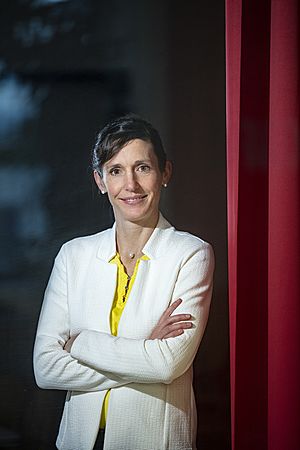Tanja Stadler facts for kids
Quick facts for kids
Tanja Stadler
|
|
|---|---|

Stadler in 2023
|
|
| Born | 1981 |
| Nationality | Swiss, German |
| Scientific career | |
| Fields | Phylogenetics |
| Institutions | ETH Zürich |
Tanja Stadler is a smart mathematician and a professor at ETH Zurich in Switzerland. She studies how things change over time using computers. This field is called computational evolution. She was also the head of the Swiss Scientific Advisory Panel for COVID-19. This group gave advice to the Swiss government during the pandemic.
Contents
Tanja Stadler's Career Journey
Tanja Stadler studied applied mathematics and statistics. She went to universities in Munich, Cardiff, and Canterbury. In 2008, she earned her PhD from the Technical University of Munich. Her research was about how new species appear and old ones disappear.
After her PhD, she worked at ETH Zürich. She became a junior group leader in 2011. Then, she became an assistant professor in 2014. She was promoted to associate professor in 2017. Finally, she became a full professor in 2021.
Amazing Research and Discoveries
Understanding Life Through Evolution
Tanja's research helps us understand big questions in biology. She looks at how life changes over time. This includes how different species came to be. She also studies how diseases like COVID-19 and Ebola spread.
Tanja uses a special mix of mathematics, computer science, and biology. She develops tools to study how populations and diseases evolve. She uses genetic data to see how things have changed.
Tracking Diseases and Evolution
Tanja helped create new ways to use statistics. These methods track how diseases spread using genetic information. For example, she showed how HCV and Ebola spread. She also studied how Zika virus moved around.
Her work showed that influenza (flu) waves in a city are linked to travel. She also gave important real-time information during the COVID-19 pandemic. In another area, she explored how the extinction of dinosaurs affected mammals.
Tools for Scientists: BEAST 2
Tanja's team created "Taming the BEAST" in 2016. This is a workshop and online resource. It teaches scientists how to use a program called BEAST 2. BEAST 2 helps scientists understand evolution from genetic data. Her team has added many useful parts to this program.
Studying Viruses in Wastewater
Tanja is now leading a project to study viruses in wastewater. This helps scientists understand how diseases like SARS-CoV-2 (the COVID-19 virus) and influenza are spreading. Her team can estimate how fast these viruses are reproducing. This helps us understand new virus variants.
Helping During the COVID-19 Pandemic
During the COVID-19 pandemic, Tanja was very important. She led the Swiss National COVID-19 Science task force. This group advised the Swiss government. She was in charge of sharing weekly updates on the pandemic. She also explained scientific findings to government leaders.
Tanja's daily calculations of the virus's reproductive number were key. This number shows how many people an infected person will pass the virus to. Her team also led efforts to sequence the SARS-CoV-2 virus in Switzerland. This helped find new variants like Beta, Gamma, and Delta early on.
Her team also developed a website called cov-spectrum. This tool helps track SARS-CoV-2 variants. It is used worldwide to understand how new variants emerge. When the mpox outbreak happened, her team quickly launched mpox-spectrum. This helped track that new virus too.
Tanja also spoke often on national news and TV shows. She helped explain the science of the pandemic to the public.
Personal Life
Tanja Stadler lives in Basel with her partner and their two daughters.
Awards and Honors
- 2008. TUM PhD award
- 2012. John Maynard Smith Prize
- 2013. ERC starting grant
- 2013. ETH Latsis Prize
- 2013. Zonta prize
- 2016. ETH Golden Owl for teaching
- 2021. SMBE Mid-Career Excellence Award
- 2021. Carus Prize of the German National Academy of Sciences Leopoldina
- 2022. Rössler Prize
- 2022. Highly cited researcher by Clarivate
- 2023. Member German National Academy of Sciences Leopoldina

